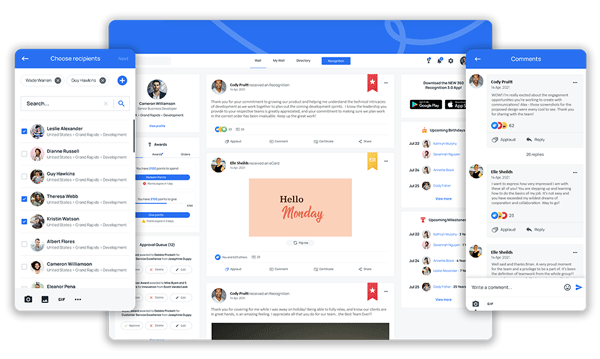June 26, 2023

By now, you’ve likely heard of hustle culture. From hustle culture memes to social media influencers -its quick rise to popularity sparked a movement that resonated strongly with some people. But for others, hustle culture has been the foundation for burnout.
At its best, hustle culture is a romanticized version of the American dream. It promises that with enough hours spent working, success is eminent. At its worst, hustle culture slowly chips away at people’s mental health and physical wellbeing.
It’s a risky mindset to say the least. So, if you think you may have a hustle culture at your company, you may want to consider reevaluating your values.
Here, we’ll take a look at what hustle culture is, why it can be harmful, and how to combat it at work.
What is Hustle Culture?
First, let’s discuss what hustle culture actually is.
Hustle culture can refer to either a workplace environment or personal lifestyle. Both place a strong emphasis on efficiency, productivity, and “getting ahead.” At the same time, it minimizes the importance of rest, self-care, and work-life balance.
Often found in hustle culture is people working a full-time job while also working on a “side hustle.” A side hustle is essentially any job a person works alongside their regular job.
This can come in many forms, but for example, it may be an accountant who also drives for Uber on nights and weekends. Or a teacher who sells her handmade jewelry online.
Side hustles oftentimes fall under what’s known as the gig economy - a labor market characterized by short-term contracts or freelance work.
Why is Hustle Culture Toxic?
At a glance, it may seem that hustle culture isn’t all that bad. After all, it emphasizes hard work and ambition – great qualities anyone would need to be successful.
But the problem with hustle culture isn’t valuing hard work or ambition. It’s valuing these things above all else. It’s having work dominate your life and believing the more you do, the more valuable you are. It’s the inherent lack of balance of being human.
And this lack of balance naturally lays the groundwork for stress, disengagement, and burnout. In fact, an analysis from Deloitte found that 77% of American workers have experienced burn out at their current job.
Furthermore, a 2021 survey published by the ADP Research Institute found that 1 in 10 employees surveyed across 17 countries have been putting in more than 20 hours of free work per week.
While many people are putting in this extra time at their full-time corporate jobs, there’s more to it than that. Experts from the World Health Organization (WHO) claim that the increase of overworking is also likely due to the rise of the gig economy. Plus, the rise of remote work has caused the boundaries between work and personal life to be increasingly blurred.
And what happens when employees become stressed, disengaged, and burned out? They quit. Especially millennials (people roughly 27 to 4). Deloitte’s study found that nearly half of millennials say they have left a job specifically because they felt burned out.
Characteristics of Hustle Culture
- Employees feeling the need to come in early and/or work late.
- Feeling pressure to not take their breaks or not take their full break.
- An emphasis on hours worked
- Feeling reluctant to use PTO or sick days
- Answering calls, emails, IMs after hours and/or on weekends
- Feeling pressure to “keep up” and an inability to say no or set boundaries.
How Can Hustle Culture Impact Health?
We know that overworking can lead to stress, burnout, and consequently, employee turnover. But what impact does it have on people’s health?
It’s likely no surprise that overworking has detrimental affects on health and wellbeing. This is because with constant work comes an increase in stress, and stress has been linked with a range of health concerns.
These health risks include an increased risk of:
- Type 2 Diabetes
- High blood pressure
- Digestive problems
- Muscle tension
- Stroke
- Fatigue
- Heart attack
But it’s not just physical health that’s impacted either. Mental health can take a turn under the chronic stress of overworking.
Hustle culture can increase the risk of developing:
- Anxiety
- Depression
- Burnout
- Insomnia

How to Combat Hustle Culture at Your Company
It may seem clear that hustle culture isn’t a sustainable office environment in theory. However, hustle culture values oftentimes find their way to sneak into companies.
Actively combat hustle culture at your company with our 4 tips.
1. Survey Your Team
Whether you think your company culture is healthy or not, it’s important to start on the right foot. Consider giving employee surveys to gain a deeper understanding of the current environment.
You may think you know what areas your company needs to prioritize, but you may find your employees are having a different experience altogether. For example, you may think your employees are handling their workloads easily, but your survey reveals a significant number of your staff are struggling with stress and burnout.
In this case, managers can begin to be proactive and use this information to address workload with their employees in one-on-one check-ins.
Also, once you’ve gathered your data, communicate your plans to your team. This will not only get everyone on the same page, but it will also show your team how valuable diversity is at your company.
2. Open Communication
Stress management is a critical factor in any job, especially today. In fact, Indeed surveyed more than 1,500 employees in March 2021 and found that 52% of respondents were feeling burnt out. Furthermore, this feeling is even more common among people working virtually.
There are a few things you can try to fight overworking at your company. First, take a look at your expectations. Do you expect employees to work late or through lunch to meet deadlines? Do you expect employees to respond to calls or emails after hours?
These types of unspoken (or spoken) expectations can breed a hustle culture. To combat this, it’s typically not enough to only reiterate taking breaks and signing off at 5pm – although you should do so. Oftentimes, employees end up feeling like it’s not worth taking breaks because it will only set them back and cause more work later.
Instead, have an open conversation with your employees. Take a look at their workloads. Try to understand the root cause of their burn out. Then, work towards making changes that will help alleviate causes of stress. This will show your employees that you’re committed to making real change and it’s not just talk.
3. Build an Employee Recognition Program
Employee recognition is arguably the simplest thing companies can do to improve not only their work culture, but drive retention and engagement as well.
In fact, research shows that:
- 82% of people are happier when they’re recognized at work. (Curiosity at Work)
- 85% of HR professionals say employee recognition programs positively affect organizational culture. (Mercer)
- When employees believe they’ll be recognized for their work, they’re 7 times more likely to be highly engaged. (Quantum Workplace)
Keep in mind that employee recognition programs aren’t a cure-all. If you have a toxic hustle culture, recognizing employees’ hard work will only be a band aid for the deeper problem of overworking your employees. However, as you work to repair your company’s culture, employee recognition is critical to employees feeling appreciated.
There are all kinds of employee recognition programs available today, from employee recognition software to service awards. Just be sure your program has clear goals, is easy to use, and is consistent. Most importantly, recognition should be genuine and authentic.

4. Build Trust, Be Flexible
Flexibility at work can mean all kinds of things. It can be letting employees start work later and finish later in the evening. It can be offering remote or hybrid options. It can be embracing mistakes as a learning opportunity when they inevitably happen.
But at the root of a flexible workplace is trust. Flexibility at work embraces the idea that employees can be productive no matter when or where they perform their work. Rather than enforcing a rigid workplace environment or schedule, workplace flexibility puts trust in the employee and empowers them to do their work in a way that’s best for them.
In many overworked, hustle culture-based environments, employees feel the need to prove their work. They may feel the need to partake in performative acts, like telling coworkers how late they worked or how little they slept.
A flexible workplace that’s based in employee trust is the antidote to the pressure of hustle culture.
RELATED: Employee Engagement Activities: 6 Ways to Boost Engagement for Remote Workers
Transform Company Culture with Terryberry
Terryberry provides solutions to help build a healthy, accepting work culture through effective employee engagement. These solutions include:
- Service Awards and Performance Awards: Recognize and reward employees based on years of service awards, anniversaries, or performance.
- Social Recognition: Empower your employees and managers to recognize their peers and celebrate successes with an easy-to-use social recognition application.
- Feedback and Communication: Unlock improved feedback and communications with employee and customer feedback solutions.
- Wellness Programs: We make it easy to run wellness programs and activity challenges that increase engagement, expand corporate health, and build team camaraderie.
Ready to learn more? Schedule a demo with our team to get a hands-on walkthrough of how Terryberry can transform the culture of your workplace.
